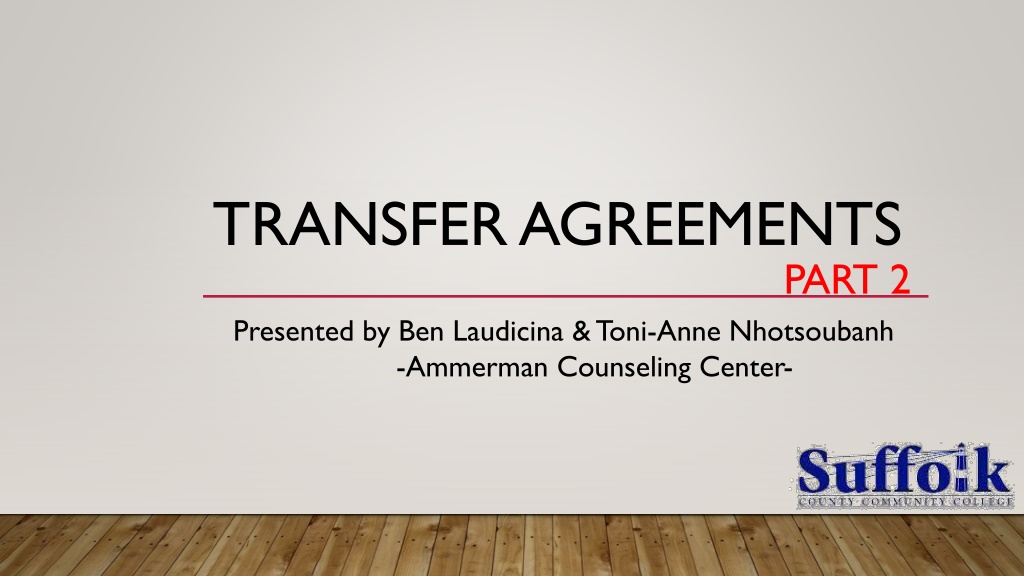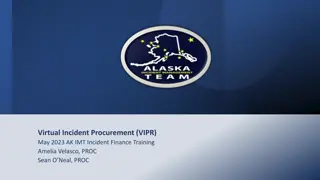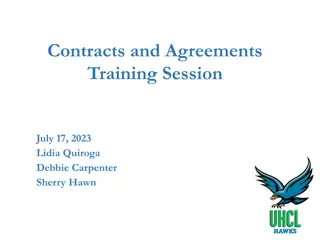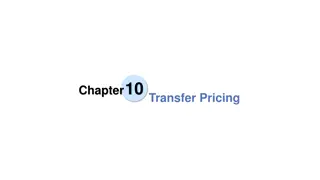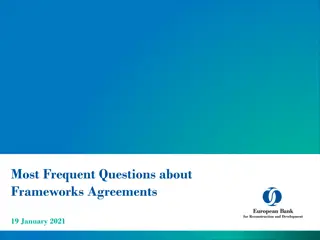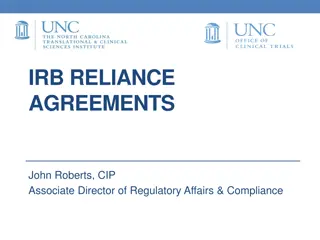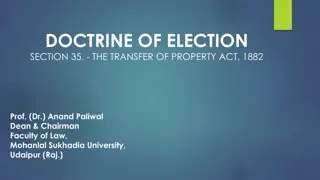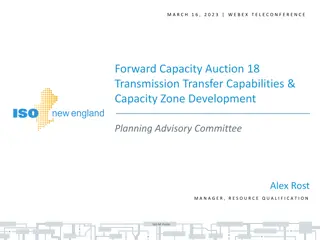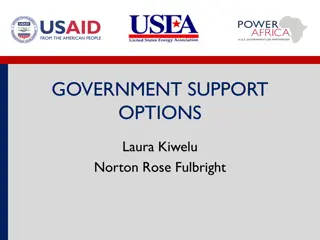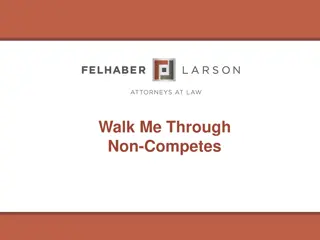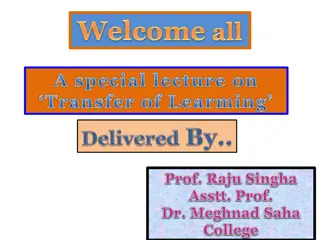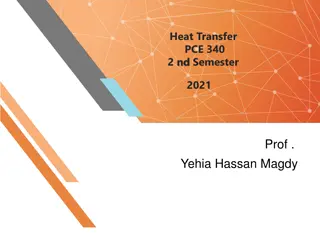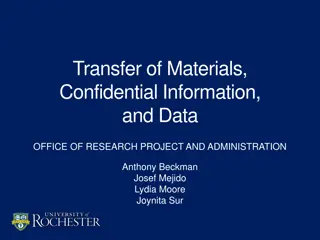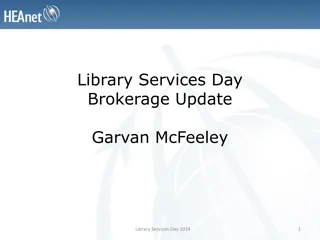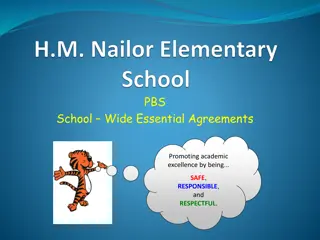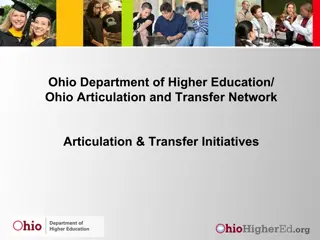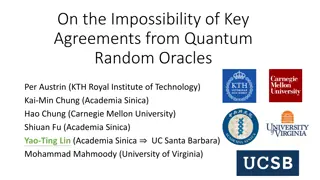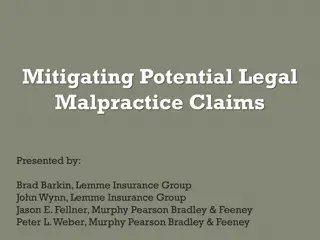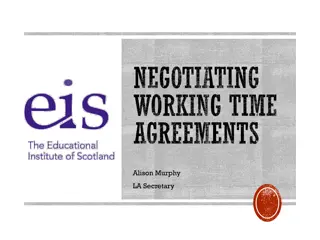Understanding Transfer Agreements in Higher Education
Discover the significance of transfer agreements in higher education through joint admission and articulation agreements. Learn how transfer agreements facilitate seamless credit transfers, maximize course transferability, and simplify the application process for students transitioning from community colleges to four-year institutions. Explore the benefits, differences, and examples of transfer agreements for a smoother academic journey.
Download Presentation

Please find below an Image/Link to download the presentation.
The content on the website is provided AS IS for your information and personal use only. It may not be sold, licensed, or shared on other websites without obtaining consent from the author. Download presentation by click this link. If you encounter any issues during the download, it is possible that the publisher has removed the file from their server.
E N D
Presentation Transcript
TRANSFER AGREEMENTS PART 2 Presented by Ben Laudicina & Toni-Anne Nhotsoubanh -Ammerman Counseling Center-
GOALS FOR TODAY Learn what transfer agreements are and understand the potential benefits Understand how to access transfer agreements available through SCCC Understand how to sign up for a joint agreement where eligible
Articulation Agreements An articulation agreement is signed by both Suffolk and a four-year partner to generally provide transfer tables with necessary courses required to transfer more seamlessly to the four-year institution. Most articulation agreements will provide students with junior standing. WHAT ARE TRANSFER AGREEMENTS? Joint Admission Agreement Joint Admission agreements provide a pathway to be admitted to Suffolk and the four-year institution. Students are guaranteed admission into the listed parallel program provided they have completed the degree at Suffolk and with satisfaction of other admission requirements. Most joint admissions agreements also include an articulation agreement. (Source: https://www.sunysuffolk.edu/apply-enroll/counseling-and- advising/transfer-counseling/transfer-agreements.jsp#about-transfer- agreements)
WHAT IS THE DIFFERENCE? JOINT ADMISSIONS ARTICULATION AGREEMENT Guaranteed transfer admission to a four-year college degree program upon completion of the Associates degree at Suffolk. May require certain criteria be met, such as a minimum GPA, prerequisite courses, etc. Articulates the expectation of courses that should be completed at SCCC to Facilitate more seamless transfer of Suffolk credits to four- year college upon completion of Associates degree at Suffolk. May require certain criteria be met, such as a minimum GPA, prerequisite courses, etc. Student must sign up to be enrolled in joint admissions Can enroll during application process up to first year or 24 credits at SCC Apply through Admissions Office Students do not need to enroll in agreement, automatically fall under it based upon their major (where eligible). May provide simplified application process towards end of your program at SCCC.
WHY UTILIZE TRANSFER AGREEMENTS Maximizes transferability of courses taken at Suffolk Eases the transfer planning process, as it shows you what courses to take at Suffolk and how they will transfer Ensure acceptance into desired college and major when criteria is met (joint admissions) May allow for simplified application process (usually joint admissions)
LET'S LOOK AT SOME EXAMPLES JOINT ADMISSIONS AND ARTICULATION AGREEMENTS * *Example of SCCC and SUNY Farmingdale Equivalency table for Computer Science Joint Admissions Agreement **Listing indicates GPA requirement, type of agreement, requirements, and link to agreement **
CHECK OUT THE REST OF THE TRANSFER PLANNING SERIES Part 1-The Basics of Transferring Part 3-Applying to SUNY Colleges & Universities Part 4-Applying to CUNY & Private Colleges and Universities
FOR QUESTIONS OR APPOINTMENTS CONTACT YOUR CAMPUS OFFICE Grant Career & Transfer Center counselingg@sunysuffolk.edu 631-851-6876 Ammerman Counseling Center counselinga@sunysuffolk.edu 631-451-4053 Eastern Student Success Center counselinge@sunysuffolk.edu 631-548-2500
